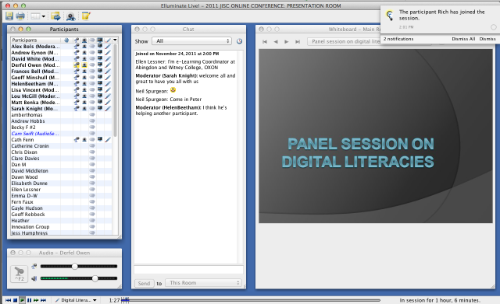JISC Online Conference session on digital literacy (#jiscel11)

I’ve just been in an interesting panel discussion at the JISC Online Conference on the subject of ‘digital literacy’. The recording of the Elluminate session is available.
The session reinforced to me just how diverse people’s views on digital literacies are. Most new to the field make the assumption that digital literacy is singular and consists of basic skills in the digital realm. In effect, digital competency. Those more experienced in the field, such as Helen Beetham, talk of the importance of this baseline – the ‘ABC’ of digital literacy as she called it, but higher-level skills as well.
Helen talked about how difficult it can be for learners to know what it is that they need to know, and also how to express it. For example, they may be confident using blogs, wikis and social networking sites, but be extremely unsure as to what’s expected in the form of a 5,000-word essay. The problem comes because we lack a coherent approach: different people and organisations own different parts of the digital landscape.
Another panellist who ‘got it’ was Dave White. Happily, both Dave and Helen are expert consultants to the JISC Developing Digital Literacies programme I’m supporting! Dave expanded briefly upon his idea of Visitors and Residents but spent most of his time talking about his intriguing idea of there being a ‘Learning Black Market‘ in education. Students, he contends, develop their ‘user-owned’ literacies that are highly effective, but these are devalued or ignored by institutions. An example of this would be their use of Google searches and Wikipedia, which they are loathe to admit to because of uncertainties around where line around ‘plagiarism’ is drawn.
It was a very interesting session, with the 102-strong members of the backchannel having a conversation at the same time. Ewan McIntosh, for example, who’s giving the closing ‘crowdsourced’ keynote trying to make sense of the whole conference, asked how we all came across our digital literacy skills. It was, in effect, a rhetorical question, as we all reflected on the fact that they were primarily self- or peer-taught on a ‘need-to-know’ or ‘interest’ basis.
It certainly got me thinking about the best ways of developing the essential elements of digital literacies I’ve identified in my research and thesis.
